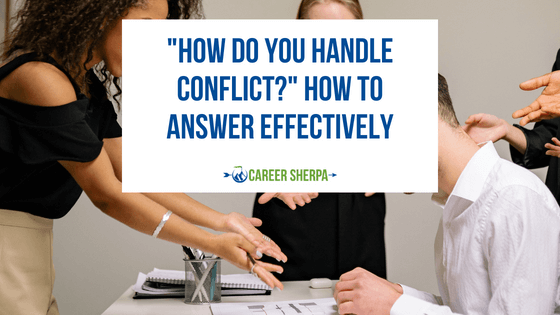No matter what position you''re applying for, you''ll probably have to answer 'How do you handle conflict?' at some point. And there''s a reason for that!

This question tells interviewers a lot about you, and they put serious weight on your response. Read this guide to learn how to answer it.
Table of contents
Why Interviewers Ask This Question
Regardless of industry or position, questions about your ability to handle conflicts are bound to arise. This is one of the most common behavioral questions that interviewers ask, and your response can substantially impact your chances of getting a job offer.
But why?
All jobs require some level of interaction with others. Some positions require constant collaboration with colleagues. But even fairly independent work will have you speaking with managers and occasionally communicating with coworkers. And when you put several people with distinct personalities together, conflicts will arise.
Disagreements come with the territory, and they have the potential to derail productivity and cause unnecessary drama that no one wants to be around. The social aspects of your career matter, and hiring managers use this question to learn many things about who you are.
Questions like 'How do you handle conflict?' serve several purposes. First, they give employers a better idea of your overall professionalism and communication skills. Good communicators can easily squash drama and resolve conflicts before they turn into serious problems. Hiring managers want to know that you can stay calm, communicate with colleagues you don’t agree with, and maintain professional decorum no matter what.
This question also highlights interpersonal skills that can help you succeed in the job. It’s about gauging your ability to listen to others and understand someone else’s perspective. You might not agree with coworkers and managers, but can you set your ego aside, find a healthy compromise, and do what’s best for the company?
Another reason hiring managers may ask this question is to see what you view as conflict. You may not be phased by a coworker expressing a different way of doing something while another candidate may get irate that a colleague would make such a suggestion. What you interpret as conflict says a lot about your personality and work style.
You might look like the perfect candidate on paper, but the only way to understand your conflict resolution and communication skills is to ask questions like this. Employers don’t want to bring people in who are a magnet for drama. People who lose their cool and get into conflicts at every turn will be more of a liability than an asset, regardless of their skills and qualifications.
'How do you handle conflict?' is an interview question that gives hiring managers insight into what you are like to manage. That’s why it’s asked so often!
How to Answer “How Do You Handle Conflict?”
It’s easy to trip up when responding to a question like this. Interviewers can pull a great deal of information from what you say, so it deserves ample thought and preparation.
Here''s how to answer this question effectively.
1. Describe Your High-Level Approach to Handling Conflict
Discussing your general approach to conflicts is the best way to start your answer. Every situation is different, but you may employ several conflict resolution strategies to prevent the problem from escalating.
For example, you should emphasize remaining calm and trying to understand the other party’s perspective. This shows you take conflicts seriously and try to minimize drama before it begins. It also displays great interpersonal skills.
Then, you could focus on your ability to be a logical and effective communicator. An approach like that allows you to focus on your natural communication skills as your biggest tool for conflict resolution.
The goal is to mention the skills you utilize to address conflicts from the jump. How do you approach these situations professionally? Model your response around those key competencies to show you understand how to resolve issues effectively.
2. Give an Example of a Workplace Conflict That You Experienced
Providing real-world examples is a fantastic way to help interviewers understand your ability to handle conflict and envision you in the role. It’s more effective to demonstrate what you do than simply state a few techniques.
Choose a real conflict you dealt with and set up the situation.
Make sure not to divulge too much information. You don’t need to go into specifics. Going too deep into the details could inadvertently make you look bad.
You must also refrain from bad-mouthing the company or colleague. Keep things positive and professional.
3. Explain What You Did to Resolve It Professionally
Next, walk the interviewer through what you did to handle the conflict. Use the example you provide to demonstrate your skills and talk about the actions you took. Return to the high-level strategies you discussed earlier to frame your answer effectively.
The most important thing is that you emphasize your professionalism. Don’t go into the personal aspects of the situation or talk about what you wish you would have done. Your goal is to show that you handle conflicts well, so frame it positively.
4. Share What You Learned from the Experience
Always end on a positive note.
The conflict you handled may have been challenging, and might not have ended as expected. That’s completely fine. What’s important is that you learned something from the experience.
Perhaps you learned how to approach situations more effectively in the future, or found new ways to empathize with the other person’s point of view. Whatever the case, lean into the lessons learned and the ultimate positive outcome from your work to resolve the conflict.
No one is perfect, and some conflicts can be tougher than others. Showing hiring managers that you work to improve and evolve makes a big difference.
5. Indicate That You’ll Defer to the Company’s Preferred Approach
Finally, don’t forget to express your willingness to use the company policies and preferred approaches. Organizations can have set rules on handling workplace conflicts, and this can vary based on the company culture.
For example, one may have a formal process that involves a mediator or HR. Others prefer that you work things out independently. Whatever the case, it’s wise to indicate your flexibility. Let interviewers know you can adapt to how the company does things and have no problem trying new conflict resolution techniques.
You could even use 'How do you handle conflict?' as an opportunity to ask thoughtful follow-ups. Inquire about how the organization prefers that employees handle conflicts. Not only does that help you learn more information about the company, but it’s an impactful question that will impress interviewers and prove that you’re serious about addressing conflicts professionally.
Mistakes to Avoid When Giving Your Answer
This question offers plenty of room to display your professionalism and communication skills, but there are ways to get it wrong. Avoid the following mistakes to ensure you always make a positive impression when giving your answer.
Don’t Say You’ve Never Dealt with Workplace Conflicts
Many job candidates make the mistake of saying they don’t have conflicts at work. That sounds like a great answer at first, but it’s unrealistic and can come off as inauthentic.
Work disagreements happen. There’s nothing inherently wrong with different perspectives and conflict. What matters most is how you handle them.
Avoid Saying Anything That Implies You Don’t Know How to Handle Conflict
Another major mistake is delivering an answer that shows you don’t handle conflict well. It’s alright if this is an area you''re looking to improve on, but you should know how to squash issues effectively. Implying that you lack those all-important communication and conflict-resolution skills will likely make hiring managers question your ability to function in the workplace.
Steer Clear of Any Potential Bad-Mouthing
As mentioned earlier, never speak negatively about former employees or colleagues. No one likes to work with someone who speaks ill of people they interact with. It only raises a red flag and makes hiring managers worry about what you’ll say if you leave the company.
Don’t Provide Cliche Answers
Cliche answers are overused and typically lack substance. In most cases, those responses aim to skirt the real answer while making it sound like you know what you’re talking about. But most of the time, interviewers see right through them.
A cliche answer might be something like 'I listen to people''s concerns and make adjustments as necessary' or 'I am really laid back, so not much get''s me stressed.' Those responses don’t provide any real information. As a result, it often puts your authenticity into question and makes interviewers think you have something to hide.
Example Answers
Now that you know how to answer this question and structure your response properly, here are some examples to help you out. Sometimes a little inspiration makes all the difference!
Example 1
In our first example, the interviewee provides a thoughtful response. They detail their approach and provide a practical example to demonstrate their conflict resolution skills. It’s a good response because it’s straightforward and provides all the information hiring managers need.
“When handling conflict, communication is important to me. I try to ask questions to better understand where my coworkers are coming from. I also remain calm and do what I can to diffuse any tension that might be building.
I believe that good communication is paramount when dealing with conflict. It helps the other person feel heard and encourages everyone to devise a compromise. I’m always open to learning new techniques and adopting any policies your company may have, but I’ve found that speaking openly about the issue goes a long way.
For example, I disagreed with a colleague at my previous job over their contributions to a project. I didn’t use much of their work for our final presentation, and they felt that I discredited their capabilities.
I met with them privately and spoke openly about the issue. I heard what they were saying and empathized with what they felt. We had an honest conversation and agreed to work more closely on our next problem to ensure that we both contributed equally to the final product.
I ended up having a great relationship with that coworker moving forward, and we learned to use each other’s strengths to both our advantages while benefiting the company.”
Example 2
Our second example covers a common point of conflict for sales teams. The job candidate reviews the situation and discusses how they approached the problem effectively. They also end positively, showing how they successfully squashed any drama.
“In my last job, I reached out to a sales prospect and had a great phone conversation that helped push them further into the sales funnel. However, I didn’t realize that one of my colleagues on the sales floor had previously talked to this individual. They approached me and were initially upset.
To avoid any drama, I sat them down and heard them out. I explained that I had no idea they contacted that prospect, and we learned that our system didn’t record my colleague’s call activity as it should have.
We both shared our frustration and came to the understanding that it was an honest mistake, with no one truly at fault. We compromised and agreed to split the commission equally if that prospect signed the deal. We proposed the idea to our team lead, who decided it was all fair.
In the weeks after, we worked together to assist this potential client. They liked our tag-team effort and ultimately closed a deal. They became one of our biggest clients that year, and we shared the commission as agreed.”
Example 3
Our final example involves a conflict with a direct supervisor. These situations can be difficult to talk about, but this candidate explains the scenario eloquently and goes over their approach to show the hiring manager that they know how to handle these problems.
“My previous manager and I had a few disagreements in the past. We worked very differently and took contrasting approaches to accomplish key objectives. Fortunately, I learned early on that communication was the best way for us to move forward.
We grew very comfortable expressing our issues to one another and gained mutual respect. I always listened and understood his perspective, which helped us find compromises when necessary.
For instance, there was one project that I wanted to be a part of, and I expressed that to my manager. But when it came time to begin, he assigned it to another colleague instead of me. Like other conflicts before, I requested a meeting with him to discuss the situation.
I explained to him that I felt disappointed and that being overlooked for that project made me feel underappreciated. He thanked me for expressing that and explained to me why I didn’t get the project. After hearing his viewpoint, I realized that my skills would be better utilized for something else.
He ended up giving me a project a few weeks later that was perfect for my skill set. It was one of my finest works, and I use it in my portfolio.
I had a great working relationship with that manager despite our differences, and I hope to use my communication skills to resolve any conflicts that might arise here. Does this company have any preferred conflict resolution methods? I’m always eager to learn more and adapt.”
Conclusion
'How do you handle conflict' is an interview question that gets asked all the time. But don''t be nervous, this is a question that anyone can answer well with a bit of practice.
And the ones that do will find themselves more likely to get that coveted job offer!
The post “How Do You Handle Conflict?” How To Answer Effectively appeared first on Career Sherpa.












